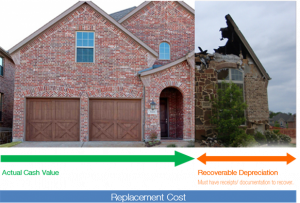Whether you own or manage a rental property, it’s critical to understand the differences between homeowner’s insurance and landlord insurance to choose the right policy options for your specific circumstances.
Do I need landlord insurance?
Insuring your property is a given, especially if there’s a mortgage on the title. But many rental property owners aren’t clear about the differences between a typical homeowner’s policy and the more specific landlord insurance policy. Add to that mix the tenant’s responsibilities and coverage requirements and as a landlord, you can quickly find yourself without adequate coverage or even no coverage at all, given certain types of property damage and liability claims.
Landlord Insurance vs. Homeowners Insurance

If your rental property is a 60-unit apartment complex, it might be obvious that you need a specific landlord insurance policy in place. But what about a 2-bedroom condo, can you simply buy a homeowner’s policy? And regardless of whether you buy a homeowner’s or landlord insurance policy, what’s covered, and what’s not included? These and several more questions need to be addressed to ensure that as a rental property owner, you are properly protected, and your investment continues to generate returns.
In essence, the difference between a homeowner’s insurance policy and landlord insurance is based on who occupies the residence. If the residence is occupied to any extent by the homeowner, a homeowner’s policy may be sufficient; for example, if you live on the main floor and rent out a mother-in-law suite in the basement. But if the residence is not occupied to any extent by the owner, then you’re best off with a landlord policy. Note that we’re not dealing in absolutes just yet, because there can be mitigating factors.
What is Landlord Insurance? How is Landlord Insurance Cost Calculated?

Insurance carriers (Safeco, Progressive, Nationwide, etc.) collect data on loss statistics across rental properties that they use to set rates and conditions for landlord policies. Based on that data they know that an owner-occupied residence is less likely to suffer from certain types of loss, while rental properties may be more prone to those losses. In calculating their loss exposure, these data are the foundation policies and requirements surrounding landlord insurance policies.
A landlord’s exposure centers around two key areas: Property, and Liability. In the case of a landlord’s property, insurance can cover damage or loss of the building itself, detached garages, sheds, fences, and other physical property from fire, lightning, wind, and other covered losses. But unlike homeowner’s insurance, a landlord policy won’t cover your personal property that might be stored or otherwise found on the property, even if it’s used while maintaining the property.
Landlord liability insurance typically protects you against claims if a tenant, their family, friends, or visitors are injured, and you’re found legally liable. This is different from a homeowner’s policy in that the tenants and their guests are only covered under this liability protection while they are in the home and on the premises related to the home. The test here is whether the injury or loss was related to your negligence in the maintenance or configuration of the property itself.
What does landlord insurance cover?

Carriers have designed landlord insurance policies to cover the most common instances of property and liability exposure, and often offer added protections on an optional basis. For example, if you keep tools and equipment like ladders, tools, lawnmowers, and similar at the property to help maintain it, you may have to buy more coverage beyond the basic landlord policy to cover them.
Landlord insurance policies are classed by the industry into three groups: DP1, DP2, and DP3 insurance policies. These three policy types address specific perils, allowing the landlord to select the coverage that best meets their needs. Below is a landlord insurance comparison of what’s typically covered under these policies:
DP1 Policy: The most basic policy level that covers only three named perils.
- Covers three named perils: Fire, Lightning, and Internal Explosion
- Actual Cash Value (ACV) Coverage if the property is damaged or removed Covers any improvements or additions made to the property
- Excludes Trees, shrubs, plants, lawn, and landscaping
- Fair rental value coverage – loss of rent insurance for cases of damage to property that result in vacancy from the specified perils.
DP2 Policy: Enhanced policy level that includes all DP1 coverages and an expanded range of named perils.
- 16 named perils: Damage from ice, snow, theft, sleet, falling objects, discharge, overflow, freezing within the plumbing, heater, AC, fire sprinkler system, household appliances, short-circuiting electric current, glass breakage, vandalism & malicious mischief
- Replacement Cost Coverage
- Debris removal of up to 5% of the value of dwelling coverage.
DP3 Policy: Comprehensive policy that includes many perils with only select perils excluded. This policy offers the most protection and even includes replacement costs.
- Generally excludes: flooding or earthquake, wear & tear, maintenance, ordinance or law, earth movement, water damage, power failure, neglect, intentional loss, mold, etc.
- May include coverage for: vandalism by tenants, fungus and mold, pests, animals, insects, air and water pollution, seepage, and sewer backup.
- Includes Replacement Cost of landlord’s personal property on-premises.
- Debris removal of up to 5% of the value of dwelling coverage.
How much landlord insurance do I need?

While these policies cover many of the basics and even some unspecified perils you may find gaps in coverage if you don’t consider added measures. Through optional coverages, your landlord policy can be enhanced to better meet your specific needs and conditions. In addition, tenants can be required to carry their own property and liability insurance. This can offer an additional layer of protection to your property and yourself.
Here are the 4 most important and often missed optional coverages for landlord policies:
- Intentional Vandalism done by tenants – This supplies coverage for any damage the tenant does on purpose to your home.
- Building codes – This option extends coverage to bring the home up to current-day building codes mandated by local authorities.
- Burglary – Covers damage to the property in case of damage due to burglary or break-in.
- Water backup coverage – Covers damage due to water backup events such as sewer or plumbing issues.
In states that allow such stipulations, tenants may be required to carry their own property and liability insurance as part of the rental or lease agreement. While there may be overlap in coverages, it’s always a good idea to require renters’ insurance as it mitigates claims against a landlord’s policy. A kitchen fire caused by a tenant can be covered under their own tenant policy and save the landlord from a potentially expensive deductible. Likewise, personal injury to a tenant or their guest while on the property can also be covered. Here are some additional considerations for tenant requirements:
- Pet deposit – Requiring a pet deposit ensures that tenants will take greater care of or can compensate you in the event of damage.
- Cleaning fee – Similarly, a cleaning fee encourages tenants to keep the premises clean and can offer deferral of some of the cleaning costs if needed.
- Pet damage coverage – Some tenant policies can provide pet damage coverage, check with your provider.
- Pet liability coverage – A tenant’s policy can protect you against claims brought by injury due to pets.
While this article has covered many landlord insurance considerations, the best landlord insurance policy for your needs depends on your specific requirements. To fully understand what is protected under your landlord insurance policy, speak with an agent today about your options for coverages. For more information, visit our FAQ section below or speak to one of our agents about what insurance policy is best for you.
Frequently Asked Questions About Landlord Insurance
Does landlord insurance cover tenant damage?
If tenants intentionally damage your property, your policy could cover the costs of repairs. Typically, dwelling coverage is included and helps protect against damage to your rental property. Unintentional damage may be covered but if a tenant steals your property or if the damage is considered “general wear and tear”, you would pay out of pocket.
Why do landlords require renters’ insurance?
Landlords can require tenants to have renters’ insurance to protect tenants in cases of damaged or lost property. Renters insurance also protects landlords in cases of liability lawsuits like guests of tenants getting injured.
Can a landlord require renters’ insurance?
Landlords can require renters’ insurance in the lease agreement and could ask to be added as an interested party to be informed of insurance confirmation, changes, and cancellations. Having your landlord as an interested party on your policy simply means they are sent proof of insurance from your insurance provider and will be informed of cancellations or changes.
Do I need homeowners’ insurance for a rental property? Does homeowners’ insurance cover rental property?
Homeowners’ insurance will not be able to cover separate rental properties. Because your property is being rented to tenants, you will need landlord insurance for the property. You could have them covered under an umbrella insurance policy if your insurance provider allows it.
Does umbrella insurance cover rental property?
Umbrella insurance can extend the liability coverage of your landlord policy in certain cases. If you have multiple properties and assets, costs and coverage should be discussed with an agent to find the best value.
Do I need landlord insurance?
As with any asset, insurance is mandatory to protect your equity and shield you from potential liability. A landlord policy is specifically designed to protect your property when other people are living in it which makes it different from the typical homeowner’s policy.
Should I require tenants to maintain renters’ insurance? Is renters’ insurance worth it?
Renters’ insurance can provide protection for lost or damaged renters’ personal property and out-of-pocket costs for hotel stays.in case of accidents. Although a landlord’s property insurance can also cover accidents, it doesn’t cover a tenant’s lost belongings.
What does landlord insurance not cover?
Landlord insurance typically won’t cover tenants’ personal possessions that are damaged or stolen, or relocation costs. Requiring renters’ insurance ensures the safety of tenants’ belongings and relieves the landlord of the responsibility when claims occur.
E&OE. All trademarks are trademarks or registered trademarks of their respective owners and are used here in accordance with the fair use doctrine of the US Copyright Act. This work is Copyright © 2022 Phoenix Insurance Inc. – All rights reserved.

